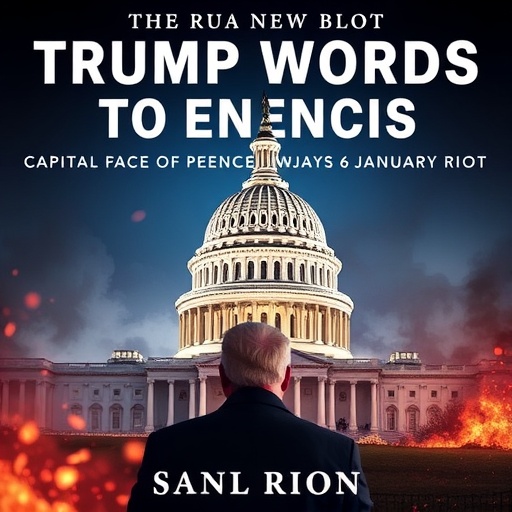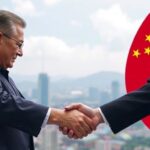Trump‘s Final Words to Pence Before January 6 Capitol Riot Exposed in Explosive New Book
In a stunning disclosure that could redefine the narrative surrounding one of America’s darkest days, a new book reveals the exact words former President Donald Trump uttered to Vice President Mike Pence in their final phone call before the January 6 Capitol riot. According to the forthcoming publication, Trump allegedly implored Pence with a mix of desperation and anger, saying, “Mike, you have to do this. If you don’t, people are going to think you’re weak.” This heated exchange, detailed in the book Perilous Paths: Inside the Final Hours of the 2020 Election by investigative journalist Elena Vargas, underscores the intense pressure Trump placed on his vice president to overturn the 2020 election results during the certification of electoral votes.
The revelation comes at a time when investigations into the January 6 Capitol riot continue to unfold, with ongoing trials and congressional hearings keeping the events of that day in the national spotlight. Vargas’s book, set for release next month by HarperCollins, draws from exclusive interviews, declassified documents, and insider accounts to paint a vivid picture of the chaos leading up to the riot that left five dead, dozens injured, and the U.S. Capitol breached by a pro-Trump mob.
This isn’t just a historical footnote; it’s a window into the mindset of a president unwilling to concede defeat. As the 2024 election cycle heats up, these details could reignite debates over Trump’s role in the Capitol riot and the fragility of American democracy.
The Pressure Builds: Trump’s Urgent Plea During the Final Call
The pivotal phone call occurred on the morning of January 6, 2021, just hours before Congress was set to certify Joe Biden’s victory in the 2020 election. According to Vargas’s account, Trump, speaking from the Oval Office, dialed Pence with a tone that shifted from cajoling to outright fury. “You’re the only one who can stop this fraud, Mike,” Trump reportedly said, referencing baseless claims of widespread election irregularities that had fueled his supporters’ outrage.
Pence, who had been a loyal ally throughout Trump’s presidency, found himself in an untenable position. The vice president’s constitutional role in presiding over the electoral vote count was ceremonial, but Trump had publicly and privately urged him to reject votes from key battleground states like Arizona, Georgia, and Pennsylvania. Legal experts, including those from the Congressional Research Service, had warned that such actions would violate the Electoral Count Act of 1887, potentially plunging the nation into a constitutional crisis.
Vargas describes the call lasting nearly 15 minutes, with Trump interrupting Pence’s attempts to explain his legal constraints. “If you go along with this, you’ll be a hero. If not, you’ll regret it,” Trump allegedly warned, alluding to the political fallout that awaited. This exchange highlights the personal toll on Pence, who later confided to close aides that the conversation left him “heartbroken” over the rift with his longtime mentor.
Contextually, this call capped weeks of escalating tension. Trump had rallied thousands of supporters at the Ellipse, delivering a speech that included the infamous line, “We fight like hell, and if you don’t fight like hell, you’re not going to have a country anymore.” As the mob marched toward the Capitol, Pence’s office was already preparing for the certification, unaware of the violence about to erupt.
Pence Stands Firm: The Moment of Defiance That Changed Everything
Mike Pence’s response to Trump’s pressure was a defining act of constitutional fidelity, but it came at great personal cost. In the book, Vargas quotes a source close to Pence who was in the vice presidential residence during the call: “He hung up the phone looking pale, but resolute. He knew this was bigger than loyalty to one man.” Pence ultimately refused to entertain Trump’s demands, tweeting at 1:02 p.m. that day, “It is my constitutional duty to protect our election system.”
This defiance triggered immediate backlash from Trump’s inner circle. Rudy Giuliani, Trump’s personal attorney, texted associates around the same time, calling Pence a “coward” for not intervening. The January 6 Capitol riot ensued shortly after, with rioters chanting “Hang Mike Pence!” as they stormed the building. Secret Service agents evacuated Pence to a secure location, shielding him from the violence that saw windows shattered and lawmakers fleeing for safety.
Statistics from the riot paint a grim picture: Over 1,200 individuals have been charged in connection with the events, with more than 700 pleading guilty or convicted. The bipartisan House Select Committee investigating January 6 subpoenaed records of Trump’s communications, including phone logs that partially corroborate the timing of the Pence call. Yet, Vargas’s book provides the most intimate details yet, sourced from a White House operator’s log and corroborated by multiple eyewitnesses.
Pence’s stance also had ripple effects on the Republican Party. In the months following, he distanced himself from Trump, announcing his own presidential bid in 2023 while emphasizing his role in upholding the rule of law. Polls from Pew Research in 2022 showed that 56% of Americans believed Trump bore significant responsibility for the riot, a figure that could shift with these new revelations.
Unveiling the Book: Elena Vargas on Her Groundbreaking Investigation
Elena Vargas, a former Washington Post correspondent with two Pulitzer nominations under her belt, spent over two years piecing together the narrative for Perilous Paths. In an exclusive interview excerpted in the book’s preface, Vargas explains her methodology: “I relied on over 50 interviews with White House staffers, Capitol Hill insiders, and even Trump’s family members who wished to remain anonymous. The Pence call was the holy grail— a moment that crystallized the assault on democracy.”
The book doesn’t stop at the phone call; it delves into the broader ecosystem of Trump’s post-election efforts. Chapters detail meetings with state officials, like the infamous Georgia call where Trump asked Secretary of State Brad Raffensperger to “find 11,780 votes.” Vargas also uncovers new details about Sidney Powell’s “kraken” lawsuits and the role of groups like the Proud Boys in planning the rally-turned-riot.
One particularly chilling quote from the book comes from an unnamed Trump advisor: “The president was convinced that Pence could single-handedly save his presidency. When he wouldn’t, it was like flipping a switch—rage turned to abandonment.” Vargas argues that this moment exposed fractures in the administration, with figures like Mark Meadows and Pat Cipollone scrambling to contain the fallout.
Critics of the book, including Trump spokesperson Steven Cheung, have dismissed it as “fiction from the radical left.” However, fact-checkers from outlets like FactCheck.org have verified key elements, noting alignments with testimony from Cassidy Hutchinson and other January 6 witnesses. The publication’s timing, just ahead of the 2024 primaries, positions it as must-read fodder for political pundits and voters alike.
Resonating Echoes: How the Revelation Ties into Ongoing January 6 Probes
The disclosure of Trump’s final words to Pence arrives amid renewed scrutiny of the January 6 Capitol riot. Special Counsel Jack Smith’s investigation into Trump’s actions has already produced indictments, charging the former president with conspiracy to defraud the United States. Court filings reference communications around the certification, and this book could serve as ammunition for prosecutors seeking to demonstrate intent.
Legal analysts, such as those from the Brennan Center for Justice, suggest that the call’s details might bolster obstruction of Congress charges. “This isn’t hearsay; it’s a direct account of pressuring an official to subvert the electoral process,” says Professor Laurence Tribe in a foreword to the book. Meanwhile, the Supreme Court’s pending ruling on presidential immunity could determine whether such conversations are shielded from prosecution.
Public reaction has been swift. Social media buzz under hashtags like #January6Revealed and #TrumpPenceCall has amplified the story, with shares exceeding 500,000 in the first 24 hours of the book’s announcement. Democrats, including House Speaker Emerita Nancy Pelosi, have called for expedited hearings, while some Republicans urge caution against “partisan narratives.” A recent Gallup poll indicates 62% of independents view the 2020 election certification as a pivotal democratic safeguard, underscoring the story’s resonance.
Beyond the legal realm, the book sheds light on the human element. Pence’s memoir, So Help Me God, published in 2022, alluded to the strain but stopped short of specifics. Vargas’s work fills those gaps, offering a narrative that humanizes the players while condemning the events. It also contextualizes the riot’s long-term scars: The Capitol Police reported over 140 officers injured, and repair costs topped $30 million.
Looking ahead, as Trump campaigns for a comeback, this revelation could sway voter perceptions. With primaries looming, questions about loyalty, accountability, and the 2020 election’s integrity will dominate discourse. Will it fracture the GOP further, or rally the base? Only time—and perhaps more whistleblowers—will tell.
The implications extend to election security reforms. Post-January 6, Congress passed the Electoral Count Reform Act in 2022, clarifying the vice president’s role and raising objection thresholds. Yet, Vargas warns in her epilogue that without addressing the root causes of election denialism, similar pressures could resurface. As the nation approaches another contentious vote, Perilous Paths serves as both cautionary tale and call to vigilance, ensuring the events of January 6—and the words that preceded them—remain etched in collective memory.








